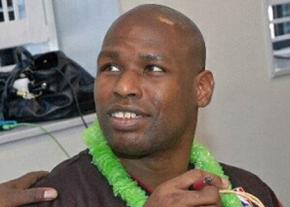Accused of assault, and he didn’t touch a gun
A New York City man has been charged in connection with a shooting in Times Square. But as reports, he didn't fire the shots--the police did.
THE TWISTED logic of our criminal justice system is on full display in New York City right now.
Two NYPD officers fired their weapons at Glenn Broadnax, an unarmed Black man, on September 14. The cops missed and hit two innocent bystanders--yet Broadnax has been charged for the shootings.
Broadnax allegedly walked into traffic at 42nd Street and Eighth Avenue near Times Square and began throwing himself into the path of oncoming cars. When police arrived on the scene, they were unable to get Broadnax--who was reportedly mentally disturbed at the time, "talking" to dead relatives and attempting to kill himself by getting hit by a car--to come out of traffic.
According to police, Broadnax then reached into his pocket--at which point, the officers opened fire in the middle of one of the most crowded areas in New York City. Broadnax--who, it turns out, was reaching for a wallet, not a gun--was not hit, but two female bystanders were shot. Broadnax was later arrested, after being Tasered by police.

Although he was initially charged with misdemeanors, including resisting arrest, menacing and drug possession, on December 4, Broadnax was charged with assault--because, according to Assistant District Attorney Shannon Lucey, "The defendant is the one that created the situation that injured innocent bystanders."
Mariann Wang, a lawyer representing one of the injured bystanders, summed up the lunacy of charging Broadnax with assault: "It's an incredibly unfortunate use of prosecutorial discretion to be prosecuting a man who didn't even injure my client...It's the police who injured my client."
THIS INCIDENT isn't the first time NYPD officers have shot at someone "armed" only with a wallet. In an infamous case in 1999, cops shot and killed unarmed street vendor Amadou Diallo in a hail of 41 bullets, sparking outrage throughout the city. The police claimed they mistook Diallo's wallet for a gun. Although the medical examiner stated that at least one of the shots was fired while Diallo was already laying on the ground, none of the police officers who shot him were convicted of any crime.
In 2007, 18-year-old Khiel Coppin, holding nothing more than a hairbrush, was shot 20 times and killed by police. In 1997, 17-year-old Andre Burgess was shot and injured by police, while he held a Three Musketeers candy bar in his hand.
Diallo and Coppin were both Black, as are Burgess and Broadnax. The NYPD seems to only make the "mistake" of shooting at an unarmed person holding something other than a weapon when that person is Black.
The fact that Broadnax was also mentally disturbed at the time of the shooting is another strike against him in the eyes of police. Instead of trying to save his life, the officers opened fire. If convicted of assault, Broadnax faces 25 years in prison.
Attacks on the mentally ill by our so-called justice system are also nothing new--more mentally ill people are in jails and prisons than in hospitals. People with mental illnesses haven't always been demonized to the extent that they are now. As Hannah Wolfe wrote at SocialistWorker.org, "Before the 1970s, most mentally ill people in the U.S. were institutionalized. Then, in the guise of humanitarian reform, institutions were shut down en masse, with the promise of fabulous-sounding community mental health agencies. These, of course, never materialized."
We can have more humane treatment again for people with psychological disorders, as well as racial justice in our city--but as the prosecution of Glenn Broadnax shows, we're going to have to fight for both.


